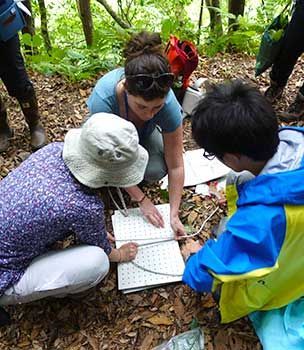University of the Ryukyus joins the Millennium Seed Bank Partnership, teaming up with British researchers to conserve Yambaru trees for the future

Researchers from the University of the Ryukyus and the Royal Botanical Gardens, Kew collecting Yambaru tree seeds. April 11, Kunigami, Okinawa (Photo provided by Professor Yasuhiro Kubota from the University of the Ryukyus)
April 13, 2018 Ryukyu Shimpo
The University of the Ryukyus has teamed up with the Millennium Seed Bank Partnership (MSBP), an international conservation project that collects and stores seeds from all over the world to ensure the Earth’s biodiversity for the future.
Researchers from the project recently came to Okinawa, and on April 11 visited the forests in Kunigami with researchers from the University of the Ryukyus to collect seeds from the forest’s trees.
The seeds are kept as a genetic resource that can last for hundreds of years, and can be used if a habitat is destroyed, if the plant is needed for (a yet-to-be-discovered) medication, or can “return home” if necessary.
This is part of a collaborative research project between the Royal Botanical Gardens, Kew, who have developed the project, and the University’s department of science headed by Professor Yasuhiro Kubota.
Currently in Japan, only the University of the Ryukyus and Kyushu University are participating in the project.
Kew is the world’s largest botanical garden, and stores 38,500 varieties of seeds from all over the world.
The research collaboration with Professor Kubota’s team, which leads the way on east-Asian biodiversity research, began last year.
For the April 11 seed collecting trip, three researchers from MSBP led by Seed Conservation Project Office Sharon Balding came to Okinawa.
They presented the project to the University, and gave instruction on how to collect and store seeds.
Balding explained that the significance of storing the seeds, “protects the diversity of plants, and as they are kept in a state where they can be used, they can be used to deal with any crisis that may arise in the future.”
At the University of the Ryukyus Yona Field in Kunigami, trees such as Sarcandra glabra and Rubus graynus were targeted as foundations of biodiversity.
The plan is to collect 130 varieties of seeds over the next two years.
Balding said, “While they may be ignored by some as all looking the same, I want the people of the world to understand the diversity of Okinawan plants and the importance they have for our lives.”
(English translation by T&CT and Sam Grieb)
Previous Article:Civilian and U.S. military buildings surrounding Henoko base exceed civil aeronautics and U.S. military height restrictions
Next Article:Onaga attends Prefectural Office for first time in 12 days, says he is spiritedly doing his best
[Similar Articles]
- University of the Ryukyus creates database of botanical resources to encourage academic/industrial cooperation
- Science Council of Japan suggests setting up national natural history museums in Okinawa and Tohoku
- Chinese classic documents from the Ryukyu Kingdom era published
- University of the Ryukyus signs exchange agreement with Korean university
- Discovery of new orchid in Yambaru reported in international journal
 Webcam(Kokusai Street)
Webcam(Kokusai Street)


